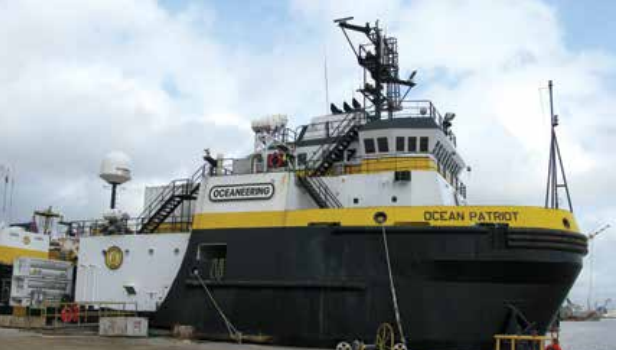NTSB investigation of the fire on board saturation diving support vessel Ocean Patriot is included in Safer Seas Digest 2015 to highlight how the lack of communication from the engineering staff to the vessel’s bridge team and pilots as well as the absence of specific procedures and training for emergency engine operations may lead to incident.
The Incident
On the evening of November 28, 2013, a fire broke out in the forward machinery space of the saturation diving support vessel Ocean Patriot while under way in the Gulf of Mexico about 50 miles south-southwest of Port Fourchon, Louisiana, but was brought under control by the vessel’s fixed fire suppression system without serious injury. Damage to the vessel was estimated at $9.8 million.
The Ocean Patriot was outfitted with a fire detection system as well as an oxygen monitoring system. At 2215, both systems sent alarms to the bridge and engine control room (ECR) alerting watchstanders of a situation in the machinery space. When the assistant engineer, who was on watch in the engine room, left the ECR to investigate, he encountered smoke on the mezzanine deck and reported the fire to the bridge.
According to the assistant engineer, the fire was located in a cable tray above an electrical motor control center; the area directly underneath the cable tray was used for storing items such as cardboard and air filters. As the first on scene, he attempted to fight the fire with a portable extinguisher but without success. On the bridge, the chief mate notified the captain, rang the general alarm, and informed the crew of the situation. During the fire, the vessel’s electrical generators began struggling to maintain power. An electrical safety device automatically tripped one engine offline when it sensed a reduction in engine speed. The chief engineer secured the other two generators as their speed and system voltage began dropping rapidly. After the main generators were secured, the emergency generator started and supplied limited power to the vessel. The vessel had no power to the auxiliary and propulsion systems but maintained power to the radars and radios.
Fire teams attempted to fight the fire but quickly reported excessive heat and smoke. At 2240, the Ocean Patriot captain ordered the release of the FM 200 (heptafluoropropane) fixed fire suppression system. The ECR monitoring system was equipped with an alarm point that would alert the watch engineer in the event FM-200 was released in any of the following five spaces: engine room, propulsion thruster room, emergency generator room, saturation generator room, and ECR. Although the crew did not receive an alarm via the engine room monitoring system (they believed the communication wires were severed by the fire), they were confident the system was discharged as they heard a “hissing roar” from the FM-200 system when it was activated.
About 15 minutes after the FM-200 release, the chief engineer found the steel deck above the fire smoking and buckled. He used a fire axe to break cement above the steel deck to allow cooling water to flow directly onto the steel. The FM-200 agent successfully extinguished the fire. Crewmembers continued to cool and monitor surrounding areas through the night and into the following morning until the vessel reached port.
Several vessels and a US Coast Guard helicopter arrived to assist. Twenty-seven nonessential personnel were transferred from the Ocean Patriot and taken ashore, including the assistant engineer who needed oxygen. The vessel was towed to Port Fourchon, from where it had departed earlier on the day of the accident.
An integrated forensic engineering investigation firm confirmed that the source of ignition was damaged electrical cables located in a cable tray that contained combustible material in storage racks just below. The fire damaged motor control centers and their associated cabling, helium storage bottles, a ventilation trunk, and various piping systems. Considerable smoke and soot damage was found in the machinery space, and the diving deck equipment stored there was also damaged. A main generator and frequency drive sustained water damage, and heat from the fire caused severe buckling to the main deck in the changing area.
The National Transportation Safety Board determined that the probable cause of the fire on board the Ocean Patriot was damage to electrical cables due to the tightly installed metal securing bands in a cable tray chafing the protective layers of the cables and creating an ignition point. Contributing to the extensive damage was the combustible material stored immediately below the cable tray area fueling the fire.
Source & Image Credit: NTSB































































